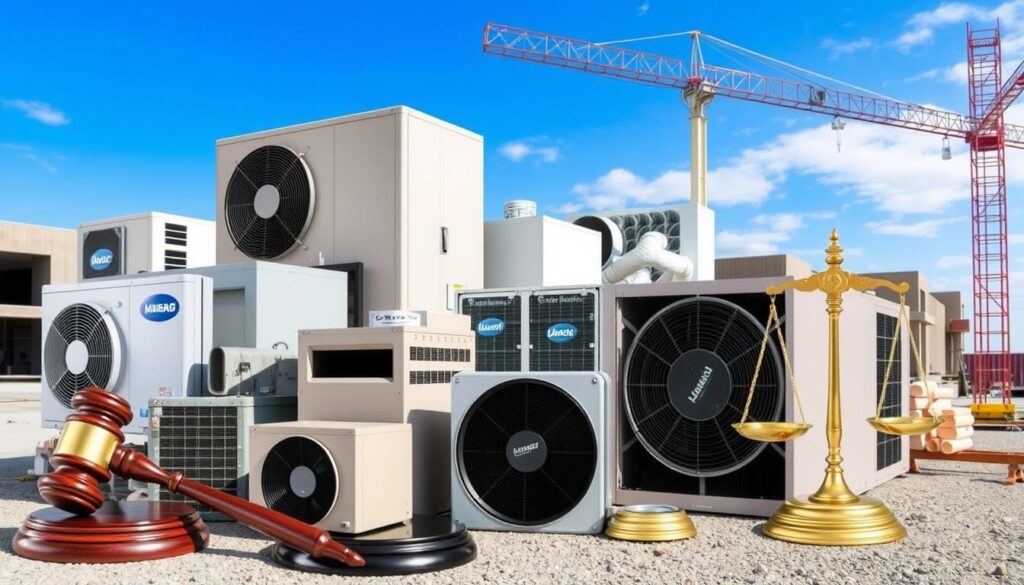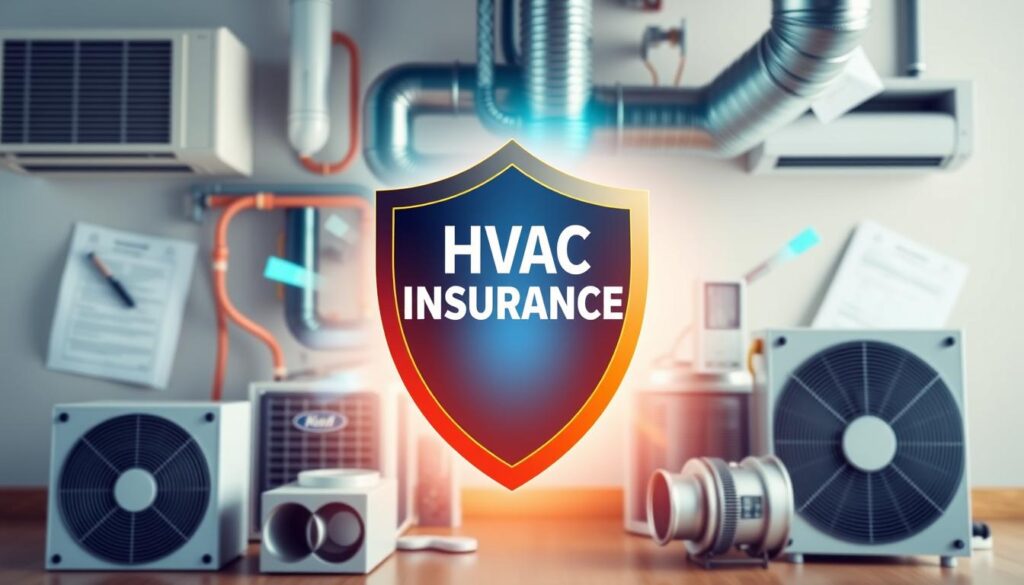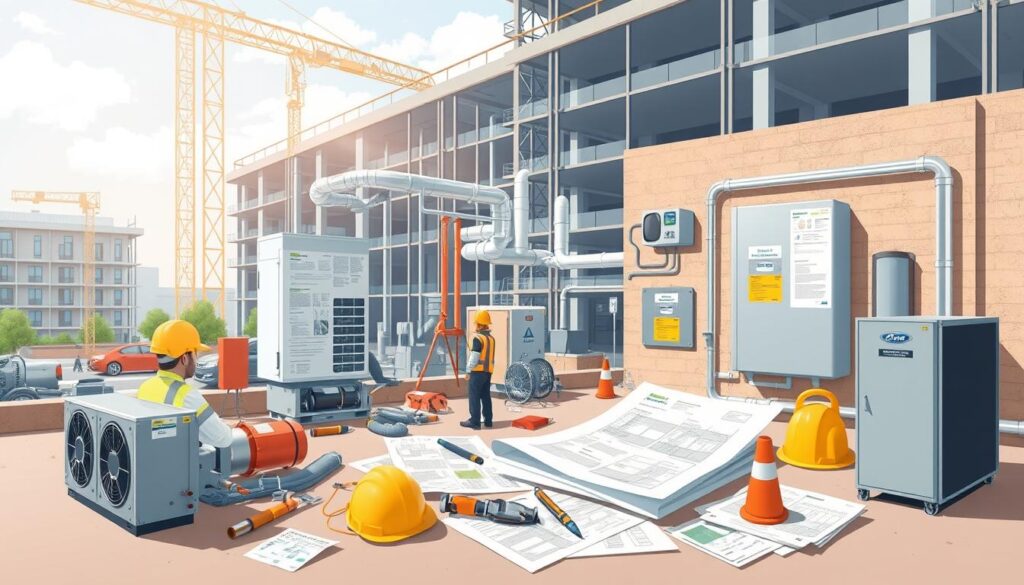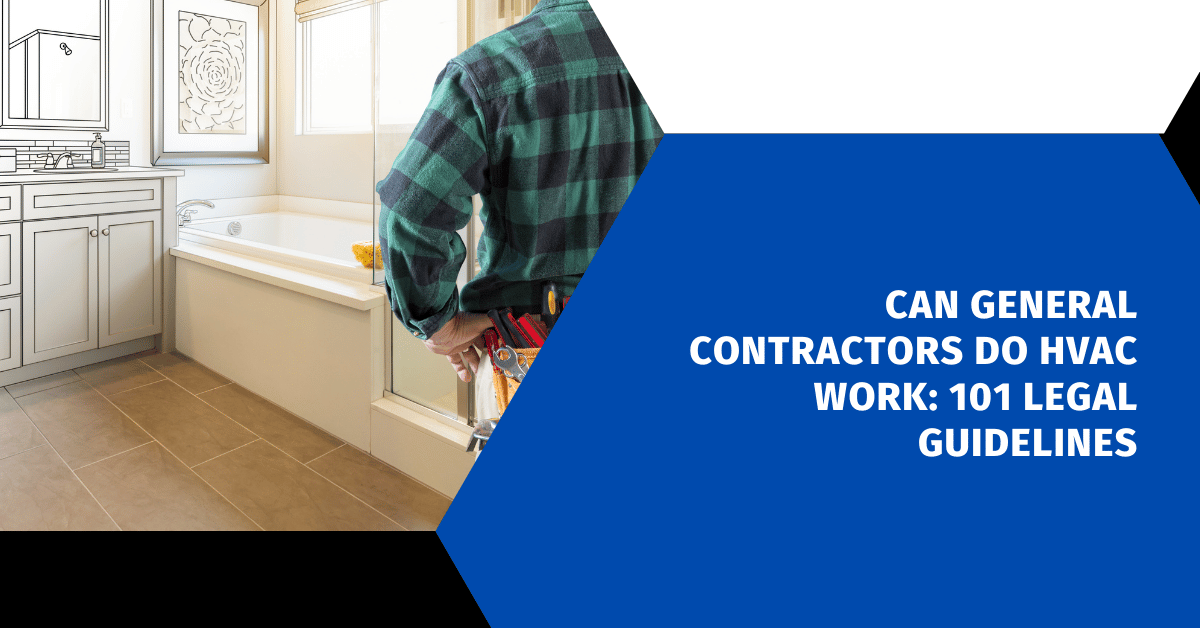Affiliate Disclosure
HVAC Guide Guys is a participant in the Amazon Services LLC Associates Program, an affiliate advertising program designed to provide a means for sites to earn advertising fees by advertising and linking to Amazon.
Can General Contractors Do HVAC Work? As a homeowner or a construction expert, you might wonder about the legal rules for HVAC work by general contractors. Can they do HVAC installations, repairs, and maintenance, or are there strict rules they must follow? This article explores the rules for HVAC contractors, guiding you through the legal world and helping you make smart choices for your projects.

Key Takeaways
- HVAC pros usually need specific licenses to legally do HVAC work in most places.
- General contractors might be allowed to do some HVAC tasks, based on state and local laws.
- It’s key to have the right licenses, insurance, and certifications for HVAC jobs to follow the law and keep things safe.
- Knowing the differences in HVAC contractor types can help pick the right people for your job.
- HVAC pros need to keep learning and getting certified to keep up with new tech and methods.
Table of Contents
Understanding HVAC Contractor Licensing Requirements
Getting a grip on HVAC contractor licensing can be tough. Each state has its own rules. Some need a special HVAC license, while others just want a general contractor’s license for big projects. For example, Kentucky requires an HVAC Contractor License, but North Dakota only needs a general contractor’s license for jobs over $2,000.
Federal EPA Requirements
HVAC pros also have to follow EPA rules. They need the EPA’s Section 608 Technician Certification to work with refrigerants.
Educational Prerequisites
To get an HVAC license, you usually need a high school diploma or GED. Some licenses ask for a bachelor’s degree. States often want a mix of classroom learning and real-world experience under a licensed contractor.
| State | HVAC Licensing Requirements |
|---|---|
| Texas | HVAC contractors must have four years of practical experience within the past six years or one year of technical school and three years of experience to obtain a license. They must also carry specific minimum amounts of general liability insurance depending on the license class. |
| Florida | HVAC contractors in Florida must have a bachelor’s degree in HVAC engineering or a related field and 2,000 hours of experience, or four years of experience in an apprenticeship program to obtain an HVAC license. There are four types of HVAC contractor licenses with varying scope and limitations. |
| Alabama | Alabama requires HVAC contractors to have at least 3,000 hours of experience under a licensed contractor and a $15,000 performance bond. |
Knowing your state’s HVAC licensing rules is key. It helps you stay legal and offer top-notch service to your clients.
Explore Our HVAC Shop
Looking for top-rated HVAC tools, parts, and accessories? Visit our shop and find the perfect solution for your needs.
Visit the ShopCan General Contractors Do HVAC Work
Whether general contractors can do HVAC work varies by state. In some places, like North Dakota, they can handle HVAC tasks with their current license. But in others, like Kentucky, they need a special HVAC Contractor License. It’s key for them to know the local and state rules before starting any HVAC projects.
Even if general contractors can do HVAC work in some areas, there are strict rules and licenses needed. Ignoring these can cause legal trouble and fines. They must be careful and make sure they have the right skills and licenses for HVAC jobs.
| State | HVAC Work Allowed for General Contractors | Specific HVAC License Required |
|---|---|---|
| North Dakota | Yes | No |
| Kentucky | No | Yes |
In short, general contractors’ ability to do HVAC work depends on state laws and licenses. They must check and follow the specific rules in their area to avoid legal problems.
Essential Licensing Requirements for HVAC Professionals
To become a licensed HVAC pro in the U.S., you need to meet certain requirements. You must pass trade and business exams, complete experience requirements, and get the right certifications. You also need to show your education and work history.
Required Documentation and Certifications
HVAC pros must provide documents to get their licenses. This includes education transcripts and work experience proof, usually 2-5 years. They also need to show they passed the trade exams.
Experience and Training Requirements
Most states require HVAC pros to have on-the-job experience. This is 2-5 years, working under a licensed contractor. They might also need to finish training programs or apprenticeships.
Insurance and Bonding Needs
HVAC contractors must have insurance and workers’ comp. States also require a surety or performance bond. The bond amount varies, from $2,000 to $15,000, based on the state and license type.
Meeting these requirements shows HVAC pros are skilled and safe. It also means they follow state and federal laws.
Explore Our HVAC Shop
Looking for top-rated HVAC tools, parts, and accessories? Visit our shop and find the perfect solution for your needs.
Visit the ShopState-by-State HVAC Licensing Guidelines
HVAC licensing rules change a lot from state to state in the U.S. Each place has its own rules, education needs, and steps to get certified. HVAC pros must follow these to work legally in their area.
In Alabama, you need a Certified Heating and Air Conditioning Contractor License. Alaska has different Mechanical Administrator licenses, like for Residential HVAC. In California, you need a C-20 license for jobs over $500. Florida has Class A and Class B licenses for certified and registered contractors.
Some states, like Colorado, don’t have state HVAC licenses. But, local areas might have their own rules. This shows how crucial it is for HVAC pros to know the state HVAC regulations and licensing boards in their work areas.
| State | HVAC Licensing Requirements |
|---|---|
| Alabama | Certified Heating and Air Conditioning Contractor License |
| Alaska | Mechanical Administrator license with specialized categories |
| Arizona | Three types of HVAC licenses for different categories of work |
| Arkansas | Six types of HVAC-R licenses, including Class A, Class B, and Class L |
| California | C-20 Warm-Air Heating, Ventilating and Air-Conditioning Contractor license for jobs over $500 |
| Connecticut | 21 different heating, piping, and cooling license types for HVAC contractors |
| Delaware | Master HVACR Restricted and Master HVACR licenses for contractors |
| Florida | Class A and Class B licenses for certified and registered HVAC contractors |
| Georgia | Class I and Class II HVAC contractor licenses with varying experience requirements |
The variety of state HVAC regulations and licensing boards across the U.S. shows how vital it is for HVAC pros to keep up with local rules. This ensures they can work legally and safely.
HVAC License Classifications and Types
The HVAC industry in the United States has different license types and classifications. Each has its own rules and work scope. It’s key for HVAC pros to know these to follow state and federal laws.
Class A and Class B Licenses
There are Class A and Class B licenses in HVAC. A Class A license lets contractors work on any system size. A Class B license might have size limits.
In Florida, for example, a Class A license covers all HVAC systems. But a Class B license is for systems up to 25 tons cooling and 500,000 BTU heating.
Residential vs. Commercial Certifications
Some states have different certifications for residential and commercial HVAC. Arizona, for instance, has separate licenses for each area. This ensures contractors have the right skills for each job.
There are also specialty certifications for certain HVAC systems or tasks. Knowing about HVAC licenses helps pros choose the right credentials. This boosts their career and ensures they meet client needs.
Explore Our HVAC Shop
Looking for top-rated HVAC tools, parts, and accessories? Visit our shop and find the perfect solution for your needs.
Visit the ShopInsurance Requirements for HVAC Contractors
As an HVAC contractor, it’s key to have the right insurance. This protects your business from financial risks. HVAC insurance usually includes general liability and workers’ compensation. The cost varies by state.
General liability insurance can cost between $100,000 to $300,000 per event. In Texas, Class A contractors need $300,000, while Class B need $100,000.
Other insurance policies might be needed too. These include:
- Commercial auto insurance to cover vehicle repair or replacement costs and rental expenses in case of accidents when transporting tools and equipment.
- Businessowners policy (BOP), which combines property, liability, and business interruption coverage tailored for small to medium-sized HVAC businesses.
- Commercial umbrella insurance to boost financial protection by increasing liability limits of underlying policies.
- Employment practices liability insurance to protect against claims of wrongful termination, discrimination, and violations of employees’ legal rights.
- Errors and omissions insurance to safeguard against negligent acts that could harm clients, commonly known as professional liability.
Also, HVAC contractors must have workers’ compensation insurance. This pays for injured workers’ medical care, rehabilitation, and lost wages. It encourages safe work habits and helps control insurance costs.
When working for a builder or contractor, HVAC pros might need extra coverage. This could include being an additional insured or waiving subrogation. It’s wise to talk to a licensed insurance pro. They can help figure out the specific cost and coverage needs for your HVAC business.

“Catastrophic losses due to property damage or personal injury could drain HVAC businesses’ assets if insurance is not in place, emphasizing the importance of having comprehensive coverage.”
Professional Certifications and Training Programs
In the HVAC world, getting certified and keeping up with new knowledge is key. The North American Technician Excellence (NATE) certification is a big deal. It shows you’re skilled and can open doors to more work.
NATE Certification Benefits
NATE certification is optional but shows you’re a pro. It boosts your reputation and gives you an edge in finding jobs. Many employers look for NATE-certified techs because they know they’re getting top-notch service.
Continuing Education Requirements
Staying current is essential in HVAC. New tech, energy rules, and safety updates keep coming. Many places require HVAC pros to take extra classes to keep their licenses. These classes help techs learn the latest industry standards and best practices.
Industry Standards and Best Practices
HVAC rules and best ways to do things change often. It’s important for pros to know these updates. They need training on things like how to handle refrigerants and design systems. Following these industry standards helps HVAC contractors stay professional and provide great service.
Explore Our HVAC Shop
Looking for top-rated HVAC tools, parts, and accessories? Visit our shop and find the perfect solution for your needs.
Visit the ShopLegal Implications and Compliance Standards
As an HVAC pro, following HVAC rules is key for your business’s success. Not following these can lead to fines, license loss, or legal trouble. This could stop you from working.
At the heart of HVAC rules are state and local licenses. HVAC workers need the right licenses to do their jobs. These licenses require education, experience, and passing tests.
- HVAC techs must know the rules for installing HVAC systems. This ensures they follow local, state, and national codes.
- The Department of Energy helps make HVAC codes. These codes are set at state and local levels in the US.
- Important groups in HVAC standards include ASHRAE for system standards, NATE for tech certification, and NFPA for fire safety.
HVAC contractors also have to follow many rules. These include safety with electricity, handling refrigerants, ventilation, fire safety, and wearing protective gear. Getting the right size and type of cooling equipment is also key. This avoids waste and saves money.
| Regulation | Description |
|---|---|
| Electrical Safety | Following electrical codes and rules to ensure HVAC systems are safe to install and use. |
| Refrigerant Handling | Following EPA rules and getting the right certification for working with refrigerants to protect the environment. |
| Fire Safety | Following NFPA codes and rules to prevent fires in HVAC system design and installation. |
Following HVAC rules is not just legal; it’s also good for your business. It ensures installations work well, keeps technicians safe, and makes buildings safe. It also helps you build trust in the industry. As an HVAC pro, keeping up with regulations, compliance standards, and legal requirements is vital for success and doing the right thing.

Conclusion
Understanding HVAC licensing is key for both general contractors and HVAC pros. Laws about HVAC work differ a lot from state to state. You might need a specific HVAC license or a more general contractor license.
General contractors need to check local and state rules before starting HVAC work. They might not have the right license or skills for these tasks. It’s important to keep learning, follow industry standards, and stick to the rules.
Having the right license, insurance, and following the rules is vital. It keeps your business legal and builds trust with clients. By keeping up with HVAC licensing and contractor rules, you can do your work safely and professionally. This way, you’ll give your clients the best service possible.

